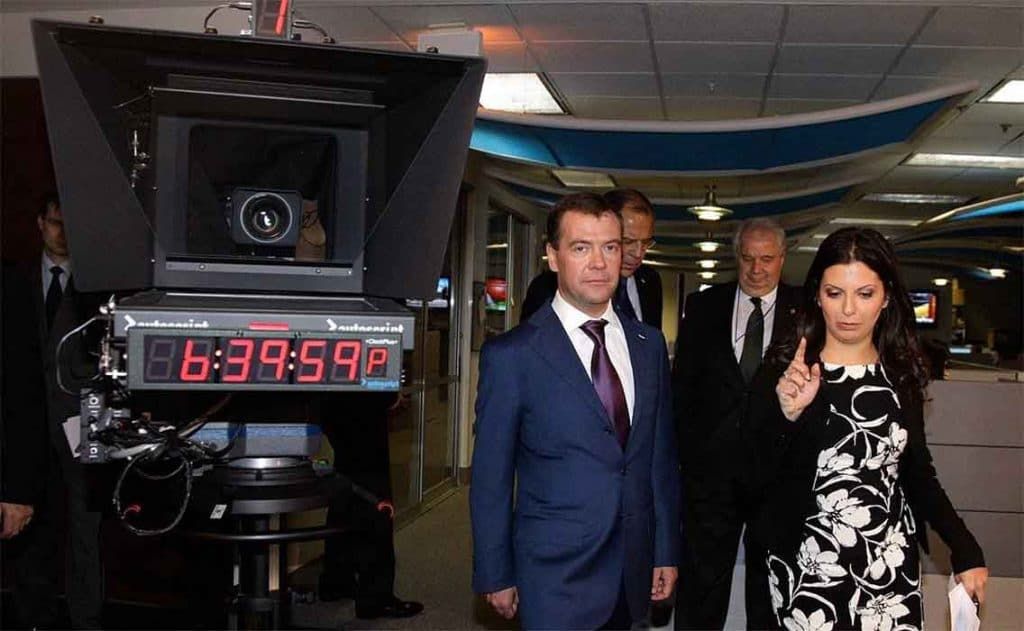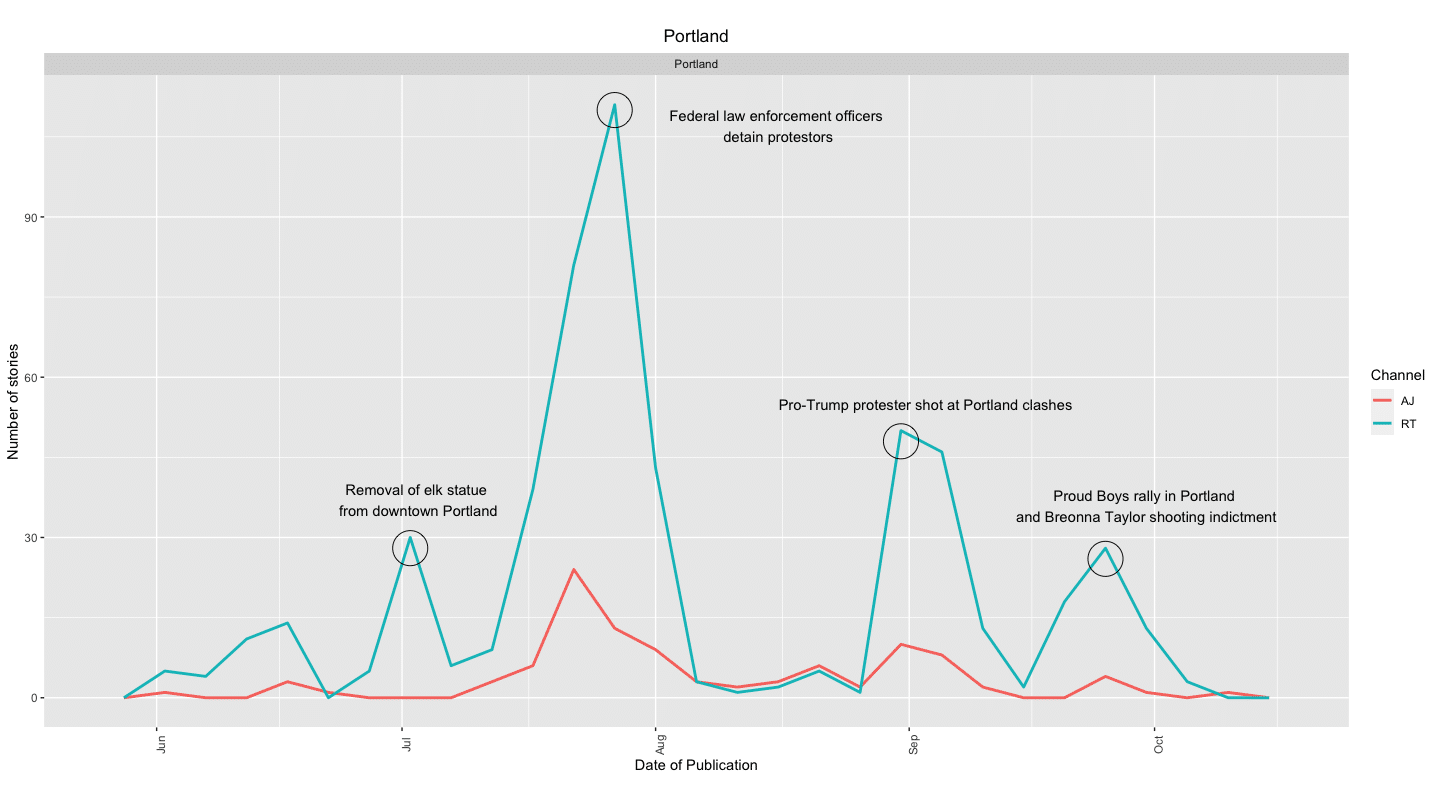Here’s how Russia’s RT spread propaganda in the lead-up to the election
By Benjamin Dubow, Evanna Hu, Jacob N. Shapiro, Ulaş Erdoğdu, Kamya Yadav | November 9, 2020
 RT's editor-in-chief, Margarita Simonyan, talks with former Russian prime minister and president Dmitry Medvedev. Credit: www.kremlin.ru. CC BY 4.0.
RT's editor-in-chief, Margarita Simonyan, talks with former Russian prime minister and president Dmitry Medvedev. Credit: www.kremlin.ru. CC BY 4.0.
As news media across the United States generally urged calm and patience as votes were counted in last week’s presidential election, the Russian government-funded RT, a multi-platform media organization which claims to be the most popular news network on YouTube, instead amplified voices of chaos. “The term ‘American democracy’ needs to be retired,” read one headline. Should Democrats win, they could “wield Neo-McCarthyism to consolidate power” warned another. The “election teeters on the verge of chaos” cried one piece as, according to another article, Portland, Ore., descended into “widespread violence & vandalism.” From RT’s perspective, things looked bad, really bad.
RT’s portrayal of the United States as rife with political violence and on the edge of collapse sets the channel apart from other American and foreign press outlets. Why, you ask, is RT so obsessed with political unrest in the United States?
To better understand RT’s agenda the Empirical Studies of Conflict Project at Princeton University teamed up with Omelas, a technology company that tracks propaganda of all kinds, to study differences in coverage between the major Russian propaganda outfit and the English-language content from Qatar-based Al Jazeera Media’s international network, a similarly-sized state-funded foreign media organization. Unlike Al Jazeera, RT consistently and energetically amplified the most sensationalistic stories about the United States.
For the network, painting a shambolic picture of the United States is part of its mission.
For months leading up to the presidential election, the network published an astounding number of stories highlighting violence and division in the country, many more than the comparable foreign network, Al Jazeera English, according to a recent analysis. When Federal law enforcement began operating in Portland, Ore., in the midst of the racial justice protests and rioting there in early-July, mainstream foreign media such as Al Jazeera reported the story. But Al Jazeeras’s coverage of events in Portland peaked at 9 stories on July 20. RT, on the other hand, published 74 stories on the topic from July 24-27, more than 18 per day.

RT functions as a tactical propaganda arm of the Russian government. Margarita Simonyan, the editor-in-chief, likens her job to that of a defense minister, and once said RT wages “information war,” according to a March 2013 article in Rossiyskaya Gazeta. Russia’s Defense Minister Sergei Shoigu in turn has declared RT, and all information, to function as “a component of the armed forces,” according to a 2015 article published by the Russian wire service Interfax.
But exactly how does RT work? What kinds of stories do they push? The answers help explain the grim picture the network is painting of the US election process.
In our analysis, we found that both Al Jazeera and RT covered many events over the course of the summer and early fall in similar ways, save two notable exceptions. Compared to Al Jazeera, RT gave vastly more coverage to this summer’s racial justice protests in the United States, training a particular focus on protest-related violence in Portland, Ore., and elsewhere. Second, RT also paid much more attention to stories relevant to Russian foreign policy priorities, especially protests after the Belarus election in early August.
So how do we know this? Omelas tracks how states manipulate the web by collecting data across a dozen social media platforms and messaging apps and automatically detecting information operation campaigns. Omelas supplied data and analysis from three RT brands targeting the United States (RT, RT America, and Going Underground RT) and three Al-Jazeera brands (Al Jazeera English, Al Jazeera US, and AJ+). A group of students working at Princeton then manually checked every story, confirming their assignment into a few different categories, including the Black Lives Matter protests, the Belarus elections, violence in Kenosha, Wis., and Portland, Ore., COVID-19, and this summer’s Hong Kong protests, among others.
There was consistency across time in the focus of each media outlets’ stories. Both try to push an agenda when reporting on events in the United States. Al Jazeera focuses on racism and repression of ethnic minorities, both in the United States and abroad. RT frequently focuses on chaos and disorder when it is covering the Black Lives Matter protests and related events.
But there are some significant differences in the networks’ coverage. Most importantly, RT does not seem to be putting much time into its reporting. During our study period from June 1 to Oct. 11, RT published 10,137 stories in English, while Al Jazeera published only 5,443.
While firm numbers on staffing are hard to come by for many news organizations, we found 406 Al Jazeera employees on LinkedIn who used the word “reporter” in their job title. RT has just 123, making them roughly six times as productive as Al Jazeera’s team.
So, how is RT a propaganda outlet? Good propaganda always mixes truth with deception, making it difficult to call out. But some patterns just stand out when we look at the share of reporting RT and Al Jazeera gives to some major issues.
In early June, as protests spread across the country, both RT and Al Jazeera covered the Black Lives Matter movement similarly, although even then RT gave almost 20 percent more space to the demonstrations. But when protest-associated violence began to crop up, particularly, in Portland, Ore., RT was way out in front, with 10 percent of stories focusing on events there by mid-July compared to just 3 percent for Al Jazeera.
The nationwide Black Lives Matter protests as well as the violence in the Portland, Ore., were both important stories. American and foreign media covered them. Even still, in comparison with Al Jazeera, RT produced a lot more content and seems to have consistently promoted the most sensational and divisive aspects of the stories.
After a summer spent covering turmoil in the United States, RT shifted gears again in August. A more pressing problem from the Russian government’s perspective was unfolding in Belarus. Huge protests were taking place after the contested re-election of President Alexander Lukashenko, allowing him to retain his 26-year grip on power. Russian President Vladimir Putin wanted Lukashenko to stay put. While Al Jazeera’s reporting on these events focused on the anti-government protests, state-led repression of protests, and at times, Russia’s involvement in Belarus, RT took a different tack. The government-funded network focused on the violent clashes between police and protesters, the unlawful nature of the protests, and opposition candidate Svietlana Tsikhanouskaya’s “self-imposed exile.”
Compared with Al Jazeera’s, the RT stories we looked at were much more inflammatory in tone, they consistently portrayed the United States as chaotic and anarchic. The stories aren’t inaccurate, but—taking into account RT’s framing of the stories and the sheer level to which it amplified them– it’s easy to see them for the propaganda that they are.
What does this all mean with respect to how Russian propaganda works? RT has two clear goals. First, it pushes out an extremely high number of thinly reported stories which make it seem like the United States has a flawed political systems and faces deep law-and-order challenges. Second, it rapidly surges content when major events threaten Russia’s geostrategic interests.
In the wake of the US presidential election, which the Associated Press called for former Vice President Joe Biden on Saturday, RT is again amplifying divisions in the country, In one byline-less report on a protest outside an Arizona election facility where vote counting was going on, the network reported that the conspiracy theorist Alex Jones had claimed the election was being stolen. “1776 is the answer to 1984,” Jones said, a reference to the American Revolution and George Orwell’s dystopian novel “Nineteen Eighty-Four.”
Lending credibility to Jones’s inflammatory rhetoric, RT reported: “The speech was criticized as an attempt to “instigate a civil war.” Others, however, suggested Jones was simply channeling what many Americans are feeling as the nation awaits the final results of the 2020 election.”
Jones has been banned from major social media networks for hate speech and abusive behavior. To RT, however, the man who called the 2012 Sandy Hook school massacre a hoax and who was recently reprimanded for trying to sell anti-coronavirus toothpaste, is simply a “controversial pundit.”
For a bland description, that really says a lot.
Together, we make the world safer.
The Bulletin elevates expert voices above the noise. But as an independent nonprofit organization, our operations depend on the support of readers like you. Help us continue to deliver quality journalism that holds leaders accountable. Your support of our work at any level is important. In return, we promise our coverage will be understandable, influential, vigilant, solution-oriented, and fair-minded. Together we can make a difference.
Keywords: 2020 election, 2024 election, Joe Biden, Putin
Topics: Analysis, Disruptive Technologies



















To use a biblical expression about the article and its authors: Thou hypocrite, first cast out the beam out of thine own eye;
and then shalt thou see clearly to cast out the mote out of thy brother’s eye.
I do find it amusing though that the terrible Russians are “painting a grim picture of the US elections” – of course, this in no way accords to reality (for the authors at any rate).
Really nice article! Should move the clock forward to about 75 seconds.
Omelas Consulting is itself a company trying to use automated information gathering to assist “attitude modification”, i.e. propaganda. That the Bulletin should publish this shoddy, hastily-put-together hatchet job that couldn’t even get its elementary facts right is a new low! – RT International is the umbrella English-language network, RT America an entire news staff in the US (consisting mostly of Americans) and “Going Underground” is one program on RT UK! – Al-Jazeera’s rival to RT America closed down several years ago. What exists as “Al-Jazeera America” today is a small selection of news items from its main English-language service. –… Read more »
Interesting, though a bit obvious for anyone that follows any of the RT channels. One important topic that was left out was how RT favours the conspiracy theories advanced mainly by alt-right crackpots. Often they have news pieces about the new coronavirus vaccines where they manage to add Bill Gates to the mixture. It’s not always relevant, and they never state it directly, but the intent is obviously to fan the theory that Bill Gates is behind the vaccination efforts because of profit and because of his alleged interest in reducing population on Earth. And, judging from the comments on… Read more »
RT a bit player compared to FoxNews, the Sinclair Broadcast Group, that has about 130 broadcast stations that include Fox, but also CBS, ABC, etc, there’s NewsMax, InfoWars, Breitbart, there’s the paid guidance of QAnon, an ARG, Alternate Reality Game, where the players create their own conspiracy, Scooby doo style, there’s FB and Twitter Instagram. In fact, if they spent so much attention on governance, they might not need all this covert, unpatriotic and (should be jail-able propaganda, all home grown.